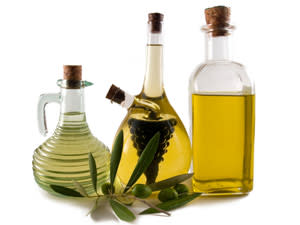Time for an Oil Change: 6 Good-for-You Cooking Oils

Smart women know they need some fat in their diet. "But moderation is key - all oils have about 120 calories and 14 grams of fat per tablespoon," says nutritionist Ellie Krieger, R.D., host of Healthy Appetite on the Food Network. She suggests sticking to about two teaspoons of added fat per meal - and cooking with a variety of oils, since they all offer different body benefits.
Here are some of the best kinds, plus delicious ways to get them in your diet.
Olive Oil
Why it's healthy: Of all the oils, olive has the highest amount of heart-protective monounsaturated fats and polyphenols - antioxidants that have anti-inflammatory and anticlotting properties. It's also a staple of the Mediterranean diet, which has been shown to lower your risk of heart disease, lengthen your life, reduce your odds of cancer and diabetes, and help you lose weight.
What it's best for: Let extra-virgin olive oil's strong flavor shine though in salad dressings, on bread, or atop grilled meats, fish, and veggies. And (surprise!) you can fry or sauté with olive oil too!
The skinny on olive oil: Choosing an olive oil can be confusing. A few tips include: Always choose extra-virgin, go imported (Spain, Italy and Greece are the biggest olive oil producers) and buy dark-colored bottles (and keep 'em in a cool place).
Canola Oil
Why it's healthy: Canola oil contains the lowest levels of unhealthful saturated fats of any oil, and it's also a good source of alpha-linolenic acid, a heart-healthy omega-3 fatty acid. The FDA recently approved canola oil products to carry the health claim that it may reduce the risk of coronary heart disease.
What it's best for: Mild-flavored canola oil is the cheapest option for sautéing and frying, and it also works well as a shortening or butter substitute in baked goods.
Peanut and Sesame Oils
Why they're healthy: Consuming a diet rich in peanuts, peanut butter, and peanut oil may be as effective in protecting against heart disease as an olive oil-rich diet, according to a Penn State study. Peanuts contain resveratrol, an antioxidant also found in wine that has been associated with a reduced risk of cancer and heart disease. Sesame oil is a good source of vitamin E, magnesium, copper, calcium, iron, and vitamin B. It also contains sesamin and sesamolin, substances that have been shown to lower cholesterol and protect the liver.
What they're best for: These oils have a high smoke point, so they work best for stir-fries.
Walnut and Flaxseed Oils
Why they're healthy: Both oils are high in omega-3 fatty acids. In fact, flaxseed has the highest concentration of omega-3s of all non-fish foods, and it also contains lignans, chemicals that may play a role in preventing cancer.
What they're best for: Their delicate flavor makes them ideal for no-cook items such as salad dressings and fruit smoothies; walnut oil can also be used for baking. Both oils must be refrigerated and used within a few months.
MORE FROM REDBOOK:
Giada De Laurentiis' Secrets for Easy Entertaining
What's Cooking on The Next Iron Chef
10 Ways to Beat Bloat
Hollywood Weight Loss Secrets
Get More on Love, Family & Fashion - Subscribe to Redbook & Save up to 82%!
CONNECT WITH REDBOOK:
Permissions:
Reprinted with permission of Hearst Communications, Inc.
